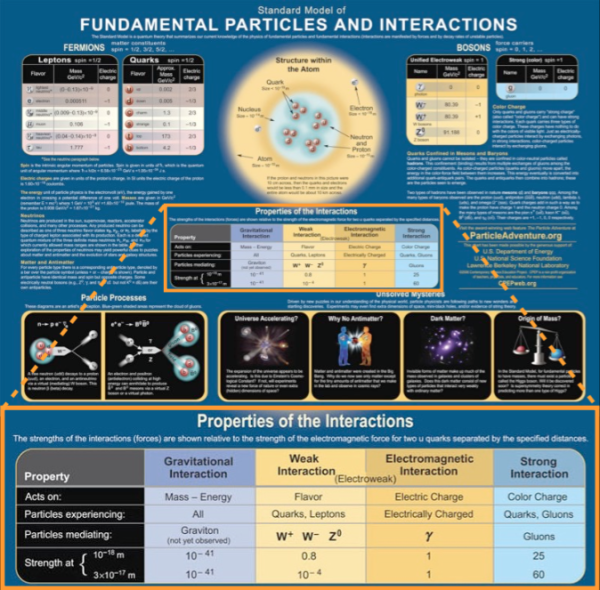"As far as extra dimensions are concerned, very tiny extra dimensions wouldn't be perceived in everyday life, just as atoms aren't: we see many atoms together but we don't see atoms individually." -Ed Witten
As we approach the end of the year, Starts With A Bang looks ahead to what's new and upcoming, rather than back on the year that was. This past week, here's what we tackled:
- Why aren't spiral galaxies more wound up? (for Ask Ethan),
- Coloring The Universe vs. The Hubble Cosmos (for Gift This, Not That),
- How young stars appear in old clusters (for Mostly Mute Monday),
- The astronaut hopeful's manifesto (contributed by Brian Shiro),
- Top 10 Physics predictions for 2016,
- and What are quantum gravity's alternatives to string theory?
We also had the Geminids come this week, the first copies of my book have shipped and -- if you're an eBook person -- you can now download the eBook version of Beyond The Galaxy immediately! Without further ado, let's see what you had to say for our comments of the week!
Image credit: Ulf Leonhardt of the University of St. Andrews, via http://www.st-andrews.ac.uk/~ulf/fibre.html.
From Wow on the analogies of Hawking radiation: "Well, I didn’t actually MAKE an analogy. I just said that the partner isn’t ascribed anything like “negative energy”, nor the other “positive”, until AFTER they’ve done their duty as hawking radiation."
You got the emphasis wrong; it should be that YOU didn't actually make an analogy; Hawking did. The (incorrect) analogy is that you have pairs of virtual particles, so it isn't your fault for thinking about one member or the other of the pairs. The analogy, however, is the thing that's fundamentally flawed. The (fully correct) thing to look at is the zero point energy state of the vacuum, which includes all sorts of Feynman diagrams we normally ignore, like tadpoles, penguins and junk.
 Image credit: NASA, via http://www.nasa.gov/topics/universe/features/smallest_blackhole.html.
Image credit: NASA, via http://www.nasa.gov/topics/universe/features/smallest_blackhole.html.
The thing you get out is a blackbody spectrum of radiation, but that radiation doesn't all originate from the black hole's surface, or realistically anyplace all that close to it. I don't exactly have a superior analogy to the one Hawking used (yet; I'll keep thinking), but my point was that all analogies have their flaws, and perhaps the "pairs of virtual particles" now lead to more misunderstandings than to actual understandings.
From PJ on the Geminids: "Tuesday, 15/12/15 03:00 local time.
Success ! One lonely straggler Geminid south of the twins. Boy, now I’ve seen it all ! !"
You know, it's rained on me up here in the pacific northwest of the USA every day this month; we've already broken the record for most rainfall in any December. We've seen road closures, flooding, people losing their homes, one person dying when a tree fell on her as she slept, and an avalanche/landslide closing down the interstate. But on Monday night, we got a break from the rain, and for just a few hours we had a clear night sky towards the East. I was looking towards Castor and Pollux, but what I saw was a brilliant streak of light fly just past Betelgeuse, lasting maybe a quarter of a second.
It's up to you, I suppose, whether you find a sight like that spectacular or not, but for me, this was great: it's the first time I've ever seen a Perseid and a Geminid meteor in the same year!
From collin237 on why all theoretical physics is garbage: "Steven Hawking didn’t “discover” anything. He conjectured. Surely the great Ethan Siegel should understand that distinction!"
There are many meanings to the word discover, and to a scientist, anytime you find out that a phenomenon exists, whether you realize it's a consequence of your theories that are already in place or whether you find it experimentally, that's a discovery. Calling it a conjecture implies that it's a "I pulled this out of my... imagination" which is grossly unfair. If General Relativity is correct outside of a black hole and Quantum Field Theory is correct for the electromagnetic and nuclear forces, then Hawking radiation exists with the spectrum and temperature that Hawking predicted. Oh, and it's Stephen Hawking, not Steven.
From Wesley Dodson on the night sky: "Great quote from Seneca."
What's most amazing to me is that when Seneca said, "A single lifetime, even though entirely devoted to the sky, would not be enough for the investigation of so vast a subject… And so this knowledge will be unfolded only through long successive ages," no one knew that the Universe extended beyond the Solar System. No one knew that stars were Suns like our own. No one knew what a galaxy was, or that there were galaxies other than our own. And as far as we know, no one had any idea of what the nature of the Universe might actually be. Which makes Seneca's quote all the more intriguing.
From See Noevo on the formation of blue stragglers: "How can you say “Mystery Solved”?
Don’t you mean ‘We have a new theory’?"
I was a little surprised that this was the question you asked. Why argue about semantics? To answer it, we had an initial theory (mergers), we had an alternative come up (the siphoning), the alternative predicted white dwarfs while the merger theory doesn't, and we found the white dwarfs. Sounds like "mystery solved" to me!
Except, scientist Natalie Gosnell, who did this work, found evidence for white dwarfs only around a third of the blue straggler stars examined! Now, which of the following does that mean:
- That the merger scenario actually is true for the other two-thirds?
- That the other two-thirds have white dwarfs that are just beyond the limits of detection thus far?
- That it really is all mergers, and that these one-third that have white dwarfs just happen to have white dwarfs?
- Or something else entirely?
That was what I expected you to ask, when I saw you outraged that I wrote "mystery solved." But as I've written before, each time we solve a piece of the puzzle, we realize that there are even more pieces that needs solving.
From Denier on the passion for being an astronaut: "Half a dozen applicant students were chosen who had to spend a week in a school storeroom closet he had built out to resemble a working spacecraft. All other students had to take a shift as ground control. It ran 24 hours a day. My shift as ground controller started at 2 AM on a Tuesday. I saw the astronauts only through video monitors and talked to them only through intercom."
Most of us never realize how lucky we are to have a teacher who can make us feel the same infectious passion for a subject that they feel until it's well past our time with them. Your experience sounds incredible and unique, and unlike anything I'd ever experienced myself. But still, there are plenty of teachers like Mr. Barainca out there who have this unfailing passion for what they do, and can do an incredible job of having it shine through in all that they do. I always thought that the Apollo command module pilots -- astronauts like Michael Collins, Ken Mattingly and Jack Swigert -- got the short end of the stick when it came to the missions to the Moon. Then, I read Michael Collins' book, and I realized his experience was just as rich as any of the moonwalkers. If you love what you do, it doesn't matter what you do. And when you're working around people you admire, respect and want on your team, it motivates you to be your absolute best. It's the rare teacher than can do that, and I'm pleased you got to have that experience.
I'll take the opportunity to give a shout-out to the unsung Alan Leipzig in south Florida, a humble middle school teacher, who's doing exactly that in his own way.
From Wow on my top 10 predictions for 2016 list: "Your second prediction is a bit of a Nonstradamus, innit? Along the lines of “The coming year will see more records broken in athletics”. Or “Michael Bay will create a movie with more explosions than ever seen in a movie before”."
The prediction was as follows: "2.) Physicists at the LHC will detect at least three particles… that turn out not to be there."
I wasn't very clear in my explanation, perhaps. This wasn't meant to be interpreted as, "physicists will see fluctuations in the data that are identified as possible-but-unlikely candidate particles, which then turn out not to be fundamental particles after all," which I think is completely true. Rather, I meant, "LHC scientists at CERN and ATLAS will claim, oooh, this particle is there, and that means XXXX for multiple Higgs particles and supersymmetry, have that picked up by the press and media who run wild with it, have it picked up by theorists who do model-building with it and crackpots who fill vixra with it, only to have more data show that the particle doesn't actually exist."
But perhaps that's so easy to see coming that when you called me "Nonstradamus" that was exactly what you saw coming, too, because that's just how it works. Still, it's a bit of a shame that a proper level of scientific skepticism doesn't come along with science communication.
From the Peak Oil Poet on fundamental physics: "so can anyone explain what makes inertia happen?"
I like to describe inertia as "how hard it is to either get something moving or change its motion," and in physics, that quantity is typically determined by an object's mass. (Although it's somewhat more difficult for a massless particle, as they have no rest frame.)
Sinisa Lazarek gave a great answer: "at the most fundamental level… Higgs" which accounts for the rest mass of all the fundamental particles that have a rest mass. But for things like protons and neutrons, which make up 99.95% the mass of all the matter we are, they get almost all of their mass from the binding energy of QCD: the strong force. But fundamentally, the thing that makes inertia happen is mass, which can either be intrinsic or emergent depending on the system in question.
There were lots of comments about ads and adblock on the Forbes site, which affected me to. You see, they turned on an "adblock-blocker" last week that affect many users in many countries (not the UK, as far as I know), and they serve you this message:
I suppose only in comparison to sites like Guff, Diply, Answers and other "click on every item to see the full list" sites can it be considered ad-light. (I have to manually crash Shockwave/Flash pretty much half the time to view my own content, so I feel your pain.) Forbes actually served up malware through an ad back in September, so I'm a little surprised at this move. I've complained to my editor about this, not just on your behalf, but on my own behalf, too.
The whole point of me creating this content is so you -- the entire world -- can enjoy it. If you can't enjoy it or even view it, something's wrong. I'm not only hearing you, I'm on board with you, too. If you figure out a hack/workaround, please continue to share with everyone in the comments as to how you do it.
Oh, and don't forget to send in your questions/suggestions for one more chance to win a 2016 Year In Space Calendar for next week's Ask Ethan!









"You got the emphasis wrong; it should be that YOU didn’t actually make an analogy; Hawking did. "
It was something that I thought may have been the case, that the original statement did make one, and the reformulations or a lesser audience (ie one with me in it) were later and didn't make that mistake.
However, looking in the paper:
Now, although the words negative energy and the idea of it flowing in to the black hole DOES appear, you have to quotemine it and ignore, at the very least, the phrase "should not be taken too literally".
The extension of that to the following change in thematic model is a bit like complaining that Bohr was wrong because QM shows the electron isn't in an orbit, it has a probability field. When the problem is that the solutions possible to come along with the more correct theme weren't going to be available in the first works discussing the general picture.
Which is more than a tad unfair.
"I wasn’t very clear in my explanation, perhaps. This wasn’t meant to be interpreted as, “physicists will see fluctuations in the data that are identified as possible-but-unlikely candidate particles, which then turn out not to be fundamental particles after all,” "
Aye, it wasn't intended to dig holes in you, but to point out that it seemed rather like a sure-fire bet under what looked to be the bet.
It would always be possible no significant new advance in the colliders would appear that year (because it can always take much longer than expected to gather enough evidence in subatomic physics), so I wasn't entirely sure that you were really just playing with the asinine "top 10" hysteria (why not top 7? It's a prime. Or top 13? A prime and bucks the western/hellenistic numerology that counts that number as "bad luck" because, well, there has to be a mystic explanation, it can't just be Murphy again).
And playing with the sillyness of a top 10 list is just fine.
If you can't play with silly, what the hell can you play with, hmm?
"but my point was that all analogies have their flaws,"
And tautologies are tautological :-)
"and perhaps the “pairs of virtual particles” now lead to more misunderstandings than to actual understandings."
Possibly, but that really means we need to make sure (IMO) that the analogy's weakness is discussed and shown to be orthogonal to the reality of the system and to do better, you need to work at learning the icky insides of the very advanced mathematics.
At which point, most of us will decide as per Calvin, that the trees sure are sneezing;
http://bucultureshock.com/the-trees-are-really-sneezing-today/
Re Forbes, they consider it ad-light compared to what they would do otherwise.
I'm willing to bet on that.
part of the problem (and if you've read bill watterson's last book on Calvin, you'll see where this is going) that the advertisers/site owners (who really only listen to the accountants who only listen to the advertisers, so are the same entity as far as worldview goes) have no interest in what we value, and we have no interest in what they percieve as value, and so neither side has something to offer that the other side is willing to give up the price for.
today, the only recourse for the vast majority is not to participate.
and, worse, with the youth today being so wedded to social media and normalised to give up whatever is demanded, the opportunity to find an actual agreement on the subject is not going to happen in the generation of anyone currently alive.
if ever.
vile little creature aren't you
disgusting
proof:
http://scienceblogs.com/startswithabang/2015/12/17/what-are-quantum-gra…
Aaaaw! Lookie! Poe here can't manage anything new, so tries spamming the same insane bullshit everywhere!
LOL!
After all, poe here thinks it's better to type bollocks on the internet and remove all doubt rather than put actual effort into thinking. I mean, that would be hard for them, and probably not work!
Shitstorming is a lot easier. No brainstem reqired.
Go on, you're fourteen, aren't you.
self-indulgent little creature aren’t you
disgusting
proof:
http://scienceblogs.com/startswithabang/2015/12/17/what-are-quantum-gra…
Yeah, self indulgent! I post the same crap "insult" on every thread, that's how self indulgent I am!
Oooh, hang on, that's not my name at the top of the post there.
It seems to some poe temp or something.
Probably a failed AI experiment.
vile little creature aren’t you
disgusting
proof:
http://scienceblogs.com/startswithabang/2015/12/17/what-are-quantum-gra…
Aye, proof indeed that you can't just bully people by insults, dearest.
And that on a science site, you really do need to provide evidence and answers to garner any form of respect. Well, not for the likes of teabaggie, but there's always one, eh?
respect? are you kidding? disgusting little creature you have no idea of respect
self-indulgent little creature aren’t you
disgusting
proof:
http://scienceblogs.com/startswithabang/2015/12/17/what-are-quantum-gra…
Yes, respect. when you get out of school and away from the gaggle of hangers on that live through you vicariously but have no actual care for your existence or wellbeing, you will find that people will want to be answered not insulted in place of answered, and that failing to do so will get you, quite geuninely called asshat, moron, dickhead, shit-for-brains, retard, stupid, troll, fuckwit and so on.
And for those, like yourself, completely unable to control their basest instincts that date back to the lizard portions of the evolution of the human species, there's a thread for you to prattle your empty and valueless "opinion" that, like the arse we all have, stinks, and produces little other than crap.
And it's here:
http://scienceblogs.com/startswithabang/2012/09/23/weekend-diversion-yo…
Though you may be attempting, possibly through a sockpuppet account, to kamikaze on me to silence a critic who can't be browbeaten or shamed by the shameless with worthless and pointles criticisms of things that have absolutely no bearing on reality or conversation, and no moral weight or validity given the onesidedness with which such fake censure is applied blindly and with partisanship.
So go over there and answer the questions. Or just fall back on the empty-headed "you ugly" "insult" that has absolutely no meaning whatsoever on the internet, and doubly so when coming from such a pestilent personality as you yourself own.
Or are you chicken?
Or just trying to troll and kamikaze as a "final solution" to someone who doesn't care for fake concern?
deluded little schmuck aren't you (is that a low IQ? zero EQ and negative ZQ)
vile
proof:
http://scienceblogs.com/startswithabang/2015/12/17/what-are-quantum-gra…
Yes, Ethan, agree with you, you have had some tough times there weather & seeing-wise. Just have to take what we can get. (Venting off seems to help occasionally)
As for the adblocker problems, I use it with Firefox & do not get issues. (so far, that is)
It's not ads I object to, it's the stalkerware that the ads plant on our computers to follow us around and read over our shoulders everywhere we go for days (in some cases months) at a time, and compile personally-identifiable dossiers on each of us that would make NSA jealous and our own mothers embarrassed. Dossiers that can be and are used to determine creditworthiness or lack thereof, job offers or lack thereof, and in general treat some animals as less equal than others.
I counted somewhere between a dozen and sixteen of those stalkers on Forbes, and would post a screenshot of the list if there was a simple way to do that.
My bottom line is, stalking is evil, full stop, and I will not tolerate being stalked. So if I can't turn it off or bypass it (I managed to do both on that Forbes page), I don't go there.
There are plenty of other venues that don't require being stalked as the price for reading. Surely we can do better.
Key sentence in Brian's article:
"Don’t drift through life; be intentional in your decisions."
Yes! Don't be a plankton that drifts with the tide, exercise your free will, and use it for good.
Those of us who could never meet the criteria for flying in space whether as an astronaut or a participant or even as cargo, can still do our part to strongly support the space program. Writing to our elected officials early and often, and especially whenever the NASA budget comes up for review, goes a long way. Spreading contagious memes about the benefits of space exploration is a force-multiplier.
Think of a political campaign season where candidates for President offered their visions for the future of the space program, and those ideas made headlines.
"There are plenty of other venues that don’t require being stalked as the price for reading. "
Not that many, and getting fewer.
@wow
hypocritical little monster aren't you
deceitful
http://scienceblogs.com/startswithabang/2015/12/17/what-are-quantum-gra…